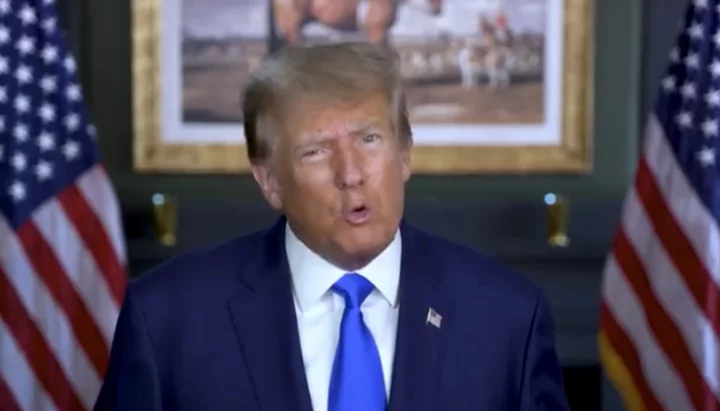
Truth Social’s merger partner reaches $18m settlement with SEC
A financial firm linked to Donald Trump’s Truth Social platform has reached an $18m settlement with the Securities and Exchange Commission (SEC) in order to bring an end to the investigation into its merger with the company. Digital World Acquisition Corp (DWAC) announced the tentative settlement on Monday, saying that the payment would “remove the cloud of uncertainty lingering over DWAC and would allow DWAC to move forward in achieving its objective of delivering a strategic merger”. The SEC had been looking into whether DWAC held talks with Truth Social’s parent company before going public, which would be a violation of certain antifraud provisions of the Securities Act and the Exchange Act. The settlement means once DWAC has paid the civil penalty it can move forward with the merger, which would see Truth Social become a public company. News of the settlement comes after three people involved in the merger were indicted for insider trading last week. Michael Shvartsman, Gerald Shvartsman and Bruce Garelick were named in a federal indictment unsealed last Thursday (29 June) in Manhattan federal court. All three were charged with trading in securities of Digital World Acquisition Corporation (DWAC) based on non-public information about the company’s planned business combination with Trump Media & Technology Group — founded by former president Mr Trump — the parent company of social media platform Truth Social. They were arrested on Thursday morning in Florida. In 2021, the three investors were invited to invest in DWAC and another SPAC. After signing non-disclosure agreements, they were provided with confidential information, including the planned deal with Trump Media. They were prohibited from using this knowledge in the open market. According to the indictment, after making initial investments into DWAC through the initial public offering process, Mr Garelick was given a seat on the board of directors, which gave him access to valuable non-public information about the planned merger. He provided these updates to his co-conspirators, calling it “intelligence”. The defendants bought millions of dollars of DWAC securities on the open market before the news of the Trump Media business combination was public. In addition to their own purchases, they also passed the information to their friends on a trip to Las Vegas, to Michael Shvartsman’s neighbours, and to Gerald Shvartsman’s employees at a furniture supply store. After DWAC’s merger with Trump Media was announced publicly on 20 October 2021, the stock and warrant holdings significantly increased in value. The defendants and the individuals they tipped then sold their DWAC securities for a significant profit. Michael Shvartsman and Bruce Garelick have been charged with five counts of securities fraud under Title 15, each of which carries a maximum sentence of 20 years in prison; Gerald Shvartsman has been charged with three counts. All three defendants have also been charged with one count of securities fraud under Title 18, which carries a maximum sentence of 25 years in prison; and one count of conspiracy, which carries a maximum sentence of five years in prison. Read More Trump news – live: Truth Social SPAC agrees to SEC settlement as Trump’s past comments on indictment resurface Why isn’t Twitter working? How Elon Musk finally broke his site – and why the internet might be about to get worse Trump mocked for ‘weird apocalyptic’ campaign video Trump marks Independence Day by sharing vulgar attack on Biden Truth Social SPAC reaches SEC settlement as Trump indictment comments reemerge – live Trump sparks speculation by ranting about ‘charges against me’ in Georgia
2023-07-05 00:24

New York Times under fire for including ‘death’ on list of six ways to cancel student debt
The New York Times has been roasted on social media for listing “death” as a means to escape crippling student loans, after the Supreme Court struck down the Biden administration’s plan to cancel debt for millions of Americans. In an article soon after the Supreme Court’s ruling was released on Friday, the Times explained six ways “to get your student debt wiped away”. The suggestions included making an income-driven repayment, appealing for public service loan forgiveness, and bankruptcy and disability discharges. Under a subhead “death”, the Times wrote: “This is not something that most people would choose as a solution to their debt burden”. It went on to explain that federal student loan debt “dies with the person or people who take it on”. The macabre phrasing drew a swift backlash on social media. “That's a little dark, NYT,” writer Parker Molloy tweeted. “We’ve reached the point where The New York Times is suggesting death as a viable solution to crushing student debt,” wrote former Secretary of Labor Robert Reich. “I’ll try it out and tell u guys how it went,” another posted. The article was later revised, with the “death” subhead being changed to “debt won’t carry on”. The Times did not respond to a request for comment by The Independent. In a 6-3 decision, the Supreme Court ruled that the Biden administration had overstepped its authority in implementing a sweeping $400bn student debt relief plan. The decision means an estimated 43 million Americans will be back on the hook for student loan repayments later this year. In a press conference on Friday, President Joe Biden insisted the fight was not over, and promised a “new path” for relief that would be legally sound. He has tasked Secretary of Education Miguel Cardona with coming up with a new forgiveness plan that was consistent with the Supreme Court’s ruling. Read More Supreme Court strikes down Biden’s plan to cancel student loan debts Biden reveals ‘new path’ to student debt relief after Supreme Court strikes down president’s plan An Area 51 blogger was raided at gunpoint by federal agents. He says the US Government is trying to silence him Trump makes brash Georgia 2020 case prediction as DoJ ‘prepares new charges’ – live Biden reveals ‘new path’ to student debt relief Army combat veteran to take over key election security role working with state, local officials
2023-07-01 05:17
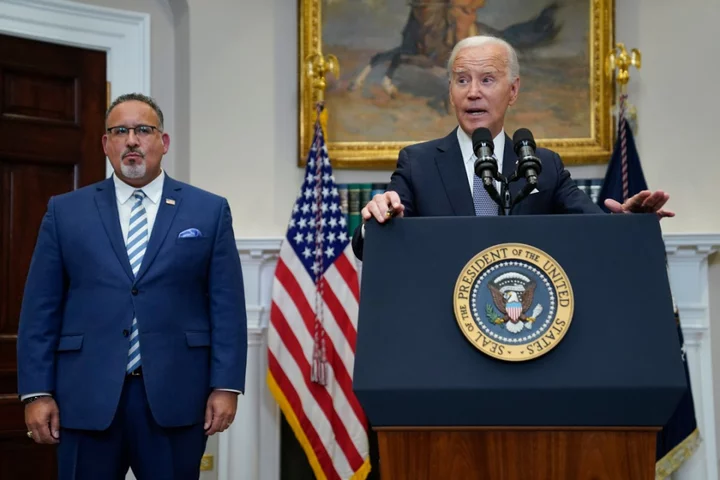
Biden reveals ‘new path’ to student debt relief after Supreme Court strikes down president’s plan
After the US Supreme Court struck down his administration’s plan to cancel federal student loan debts for millions of Americans, President Joe Biden has unveiled a “new path” for relief, one that he assured is “legally sound” but will “take longer”. In remarks from the White House on 30 June, the president hit out at Republican state officials and legislators who supported the lawsuit which enabled the nation’s highest court to strike down his student debt forgiveness initiative, accusing many of them of hypocrisy for taking money from pandemic-era relief programs while opposing relatively meager relief for student loan borrowers. “Some of the same elected Republicans, members of Congress who strongly opposed relief for students, got hundreds of thousands of dollars themselves ... several members of Congress got over a million dollars — all those loans are forgiven,” he said. “The hypocrisy is stunning,” he said. Accompanied by Secretary of Education Miguel Cardona, Mr Biden opened his remarks by acknowledging that there are likely “millions of Americans” who now “feel disappointed and discouraged or even a little bit angry about the court’s decision today on student debt”. “And I must admit, I do too,” he said. Still, Mr Biden reminded Americans that his administration has previously taken actions to reform student loan repayment programs to make them easier to access, and to keep borrowers from spending more than five per cent of disposable income on monthly repayments, and to strengthen loan forgiveness options for borrowers who take public service jobs. The president has directed Mr Cardona to “find a new way” to grant similar loan relief “as fast as we can” in a way that is “consistent” with the high court’s decision. On Friday, the Education Department issued the first step in the process of issuing new regulations under this so-called “negotiated rulemaking” process. In the mean time, Mr Biden said his administration is creating a temporary year-long “on-ramp repayment programme” under which conditions will remain largely the same as they have during the three-year pandemic-era pause in payments which is set to expire this fall. The department’s 12-month “on ramp” to begin repayments, from 1 October through 30 September, aims to prevent borrowers who miss repayments in that time period from delinquency, credit issues, default and referral to debt collection agencies. “During this period if you can pay your monthly bills you should, but if you cannot, if you miss payments, this on-ramp temporarily removes the threat of default,” he said. “Today’s decision closed one path. Now we’re going to pursue another — I’m never gonna stop fighting,” the president continued, adding that he will use “every tool” at his disposal to get Americans the student debt relief they need so they can “reach [their] dreams”. “It’s good for the economy. It’s good for the country. It’s gonna be good for you,” he said. Asked by reporters whether he’d given borrowers false hope by initiating the now-doomed forgiveness plan last year, Mr Biden angrily chided the GOP for having acted to take away the path to debt relief for millions. “I didn’t give any false hope. The question was whether or not I would do even more than was requested. What I did I felt was appropriate and was able to be done and would get done. I didn’t give borrowers false hope. But the Republicans snatched away the hope that they were given and it’s real, real hope,” he said. The Supreme Court’s 6-3 ruling from the conservative majority argues that the president does not have the authority to implement sweeping relief, and that Congress never authorised the administration to do so. Under the plan unveiled by the Biden administration last year, millions of people who took out federally backed student loans would be eligible for up to $20,000 in relief. Borrowers earning up to $125,000, or $250,000 for married couples, would be eligible for up to $10,000 of their federal student loans to be wiped out. Those borrowers would be eligible to receive up to $20,000 in relief if they received Pell grants. Roughly 43 million federal student loan borrowers would be eligible for that relief, including 20 million people who stand to have their debts cancelled completely, according to the White House. Lawyers for the Biden administration contended that he has the authority to broadly cancel student loan debt under the Higher Education Relief Opportunities for Students Act of 2003, which allows the secretary of education to waive or modify loan provisions following a national emergency – in this case, Covid-19. Since March 2020, with congressional passage of the Cares Act, monthly payments on student loan debt have been frozen with interest rates set at zero per cent. That pandemic-era moratorium, first enacted under Donald Trump and extended several times, was paused a final time late last year. Over the last decade, the student loan debt crisis has exploded to a balance of nearly $2 trillion, most of which is wrapped up in federal loans. The amount of debt taken out to support student loans for higher education costs has surged alongside growing tuition costs, increased private university enrollment, stagnant wages and GOP-led governments stripping investments in higher education and aid, putting the burden of college costs largely on students and their families. Read More Supreme Court strikes down Biden’s plan to cancel student loan debts Supreme Court strikes down affirmative action, banning colleges from factoring race in admissions Biden condemns Supreme Court striking down affirmative action: ‘This is not a normal court’ Justice Ketanji Brown Jackson delivers searing civil rights lesson in dissent to affirmative action ruling
2023-07-01 04:52
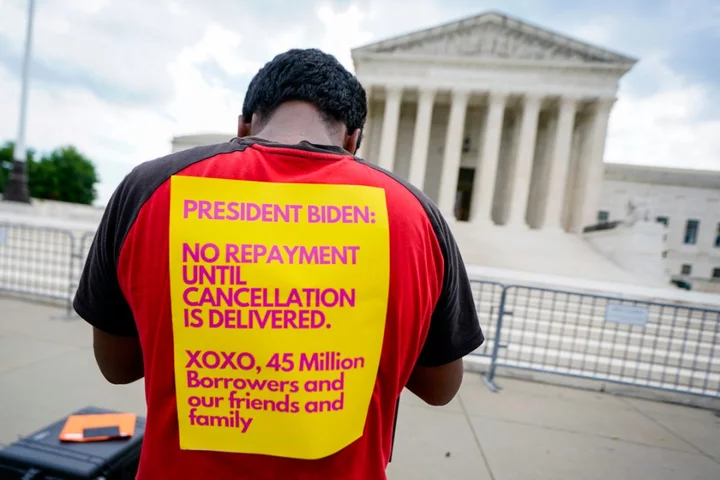
Supreme Court strikes down Biden’s plan to cancel student loan debts
The US Supreme Court has struck down President Joe Biden’s plan to cancel student loan debts for millions of Americans, reversing his campaign-trail promise as borrowers prepare to resume payments this summer. Chief Justice John Roberts delivered the 6-3 decision from the court’s conservative majority on 30 June. The ruling, which stems from a pair of cases challenging the Biden administration and the US Department of Education, argues that the president does not have the authority to implement sweeping relief, and that Congress never authorised the administration to do so. Within 30 minutes on the last day of its term, the court upended protections for LGBT+ people and blocked the president from a long-held promise to cancel student loan balances amid a ballooning debt crisis impacting millions of Americans. Under the plan unveiled last year, millions of people who took out federally backed student loans would be eligible for up to $20,000 in relief. Borrowers earning up to $125,000, or $250,000 for married couples, would be eligible for up to $10,000 of their federal student loans to be wiped out. Those borrowers would be eligible to receive up to $20,000 in relief if they received Pell grants. Roughly 43 million federal student loan borrowers would be eligible for that relief, including 20 million people who stand to have their debts canceled completely, according to the White House. Roughly 16 million already submitted their applications and received approval for debt cancellation last year, according to the Biden administration. The long-anticipated plan for debt cancellation was met almost immediately with litigation threats from conservative legal groups and Republican officials, arguing that the executive branch does not have authority to broadly cancel such debt. Six GOP-led states sued the Biden administration to stop the plan altogether, and a federal appeals court temporarily blocked any such relief as the legal challenges played out. Lawyers for the Biden administration contended that he has the authority to broadly cancel student loan debt under the Higher Education Relief Opportunities for Students Act of 2003, which allows the secretary of education to waive or modify loan provisions following a national emergency – in this case, Covid-19. Justice Roberts wrote that the law allows the secretary to “waive or modify” existing provisions for financial assistance, “not to rewrite that statute from the ground up.” The Supreme Court’s final decision of its 2022-2023 term also comes one day after another major education ruling, as the same conservative majority upended decades of precedent intended to promote racially diverse college campuses, what civil rights groups and the court’s liberal justices have derided as the court’s perversion of the 14th Amendment and the foundational concept of equal protection. Moments before its decision in the student debt plan, the Supreme Court decided a case involving a website designer who refused to cater to same-sex couples, but the case did not involve any such couple. Likewise, the case at the centre of the court’s decision on student loans involved an independent loan servicer in Missouri that did not want to be associated with the lawsuit. The six GOP-led states that led the challenge – Arkansas, Iowa, Kansas, Missouri, Nebraska, and South Carolina – opposed the Biden administration’s plan for a range of reasons that amount to “just general grievances; they do not show the particularized injury needed to bring suit,” Justice Elena Kagan wrote in her dissent. “And the States have no straightforward way of making that showing – of explaining how they are harmed by a plan that reduces individual borrowers’ federal student-loan debt,” she added. “So the States have thrown no fewer than four different theories of injury against the wall, hoping that a court anxious to get to the merits will say that one of them sticks.” She admonished a decision in which “the result here is that the Court substitutes itself for Congress and the Executive Branch in making national policy about student-loan forgiveness.” “The Court acts as though it is an arbiter of political and policy disputes, rather than of cases and controversies,” and by deciding the case, the court exceeds “the permissible boundaries of the judicial role,” Justice Kagan wrote. Since March 2020, with congressional passage of the Cares Act, monthly payments on student loan debt have been frozen with interest rates set at zero per cent. That Covid-19-pandemic era moratorium, first enacted under Donald Trump and extended several times, was paused a final time late last year – until the Education Department is allowed to cancel debts under the Biden plan, or until the litigation is resolved, but no later than 30 June. Payments would then resume 60 days later. The amount of debt taken out to support student loans for higher education costs has surged within the last decade, alongside growing tuition costs, increased private university enrollment, stagnant wages and GOP-led governments stripping investments in higher education and aid, putting the burden of college costs largely on students and their families. The crisis has exploded to a total balance of nearly $2 trillion, mostly wrapped up in federal loans. Millions of Americans also continue to tackle accrued interest without being able to chip away at their principal balances, even years after graduating, or have been forced to leave their colleges or universities without obtaining a degree at all while still facing loan repayments. Borrowers also have been trapped by predatory lending schemes with for-profit institutions and sky-high interest rates that have made it impossible for many borrowers to make any progress toward paying off their debt, with interest adding to balances that exceed the original loan. One analysis from the Education Department found that nearly 90 per cent of student loan relief would support people earning less than $75,000 per year. The median income of households with student loan balances is $76,400, while 7 per cent of borrowers are below the poverty line. That debt burden also falls disproportionately on Black borrowers and women. Black college graduates have an average of $52,000 in student loan debt and owe an average of $25,000 more than white graduates, according to the Education Data Initiative. Four years after graduating, Black student loan borrowers owe an average of 188 per cent more than white graduates. Women borrowers hold roughly two-thirds of all student loan debt, according to the American Association of University Women. Mr Biden’s announcement fulfilled a campaign-trail pledge to wipe out $10,000 in student loan debt per borrower if elected, though debt relief advocates and progressive lawmakers have urged him to cancel all debts and reject means-testing barriers in broad relief measures. In November 2020, the president called on Congress to “immediately” provide some relief for millions of borrowers saddled by growing debt. “[Student debt is] holding people up,” he said at the time. “They’re in real trouble. They’re having to make choices between paying their student loan and paying the rent.” ReNika Moore, director of the Racial Justice Program with the ACLU, among civil rights groups that filed briefs with the Supreme Court to defend the loan cancellation plan, said the “one-two punch” to end affirmative action and block debt relief will lock Americans out of economic oppurtunity and worsen wealth equality. “We urge the Biden administration and the Department of Education to move quickly to explore other pathways to ease the debt load on student loan borrowers once payments resume after a pandemic-related pause, including new executive action under the Higher Education Act, a law that allows for student loan relief for certain groups,” she added. Read More Supreme Court allows Colorado designer to deny LGBT+ customers in ruling on last day of Pride Month Biden condemns Supreme Court striking down affirmative action: ‘This is not a normal court’ Justice Ketanji Brown Jackson delivers searing civil rights lesson in dissent to affirmative action ruling The Supreme Court’s ruling on affirmative action is ugly and frustrating – but no surprise
2023-07-01 01:54

Trump Media investors charged in $22m insider trading case
Three investors in the special purpose acquisition company (SPAC) that took Trump Media public have been indicted for insider trading concerning the deal, making $22m in illegal trades. Michael Shvartsman, Gerald Shvartsman and Bruce Garelick were named in a federal indictment unsealed on Thursday (29 June) in Manhattan federal court. All three were charged with trading in securities of Digital World Acquisition Corporation (DWAC) based on non-public information about the company’s planned business combination with Trump Media & Technology Group — founded by former President Donald Trump — the parent company of social media platform Truth Social. All three were arrested this morning in Florida. More follows… Read More 3 charged in insider trading case related to taking ex-President Donald Trump's media company public White House reveals Biden uses CPAP machine for sleep apnea Jesse Watters confuses Ukraine and Iraq in attempt to mock Biden
2023-06-29 23:29

Anheuser-Busch boss says no regrets over Dylan Mulvaney’s Bud Light ad despite uproar on right
The CEO of Anheuser-Busch InBev, the parent company of Bud Light, said the beer should be about bringing people together after it faced months of backlash following its brief partnership with transgender influencer Dylan Mulvaney. In an appearance Wednesday on the programme CBS This Morning, CEO Brendan Whitworth said the company has become entangled in “divisive” conversations it should not be a part of. “I think the conversation surrounding Bud Light has moved away from beer, and the conversation has become divisive,” Mr Whitworth said. “And Bud Light really doesn’t belong there. Bud Light should be all about bringing people together.” At the moment, that is not what’s happening. Bud Light last month lost its spot at the top of the beer sales charts to Modelo as some conservative customers continue to boycott the beer following the advertisements featuring Ms Mulvaney. Mr Whitworth declined to answer directly when asked whether the campaign featuring Ms Mulvaney was a mistake. “There’s a big social conversation taking place right now, and big brands are right in the middle of it and it’s not just our industry or Bud Light,” Mr Whitworth said. “It’s happening in retail, happening in fast food. And so for us what we need to understand — deeply understand and appreciate — is the consumer and what they want, what they care about, and what they expect from big brands.” Despite being given ample opportunity to do so, Mr Whitworth did not directly defend the corporation’s decision to partner with a trans influencer or to support the trans community more broadly at a time when that community is facing a barrage of legislation targeting its rights in states across the country. “Bud Light has supported LGBTQ since 1998, so that’s 25 years,” Mr Whitworth said. “And as we’ve said from the beginning, we’ll continue to support the communities and organisations we’ve supported for decades. But as we move forward, we want to focus on what we do best: which is brewing great beer for everyone.” The controversy over corporations’ politics is not limited to Bud Light. Disney, Target, Nike and a number of other brands have also been the target of the right’s ire in recent years for taking stances on social issues at odds with conservatives. Target recently announced its decision to remove some Pride month merchandise from its stores after facing criticism from conservatives for its relative support of the LGBTQ+ community. The Starbucks Workers Union, meanwhile, accused Starbucks of restricting Pride decorations from certain stores. Read More I came out as a teen in the 90s — there’s still a long road ahead for LGBT+ youth Starbucks workers at 150 stores to strike over alleged ban on Pride decor
2023-06-29 09:52
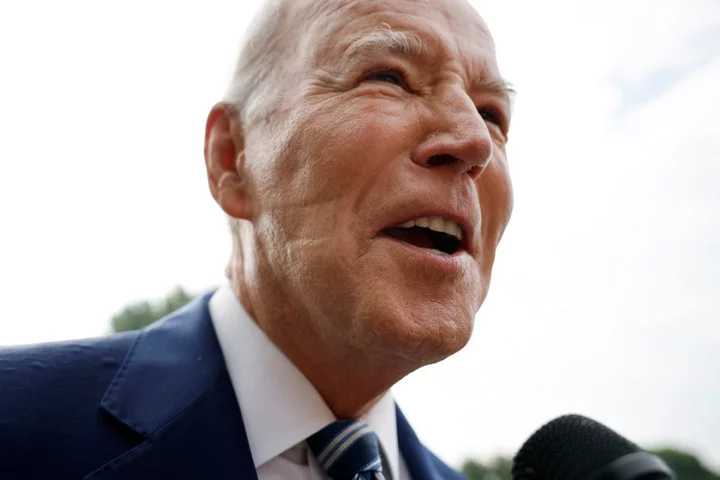
Biden touts his economic record in fiery speech: ‘Guess what – Bidenomics is working’
President Joe Biden touted his economic record amid continuing dissatisfaction among Americans with the state of the US economy by saying his policies have proven effective. Mr Biden delivered a fiery speech on Wednesday in Chicago where he sought to flip a term that the Wall Street Journal outlets have used against him--Bidenomics--into a plus. “I didn’t come up with the name,” he said. “I think it’s a plan I’m happy to call Bidenomics.” The president, who is seeking re-election in 2024, said that the US economy has largely recovered from the recession caused by the Covid-19 pandemic and had sought to refute Republican economics. “Guess what? Bidenomics is working,” he said to applause. “When I took office, the pandemic was raging and the economy was reeling. Supply chains were broken. Millions of people were unemployed.” Despite low unemployment, many Americans continue to see inflation as a top priority. A survey from the Pew Research Center last week showed that 52 per cent of Democrats and 77 per cent of Republicans say inflation is still a “very big problem.” Mr Biden sought to soothe those concerns by saying he continues to prioritise lowering prices and noted how inflation is less than half of what it was one year ago. “Bringing down inflation remains one of my top priorities today,” he said. Mr Biden also mentioned the progress that his signature Inflation Reduction Act has made, such as allowing Medicare to negotiate drug prices. “We’ve been trying to get this done for decades and this time we finally beat big pharma for the first time,” he said. Read More Watch as Biden makes statement on economic policy in Chicago Cambodian leader Hun Sen, a huge Facebook fan, says he is jumping ship to Telegram Paul Ryan says Trump is only Republican candidate who would lose to Biden in 2024
2023-06-29 02:18

Cuban entrepreneurs get business training from the US, and hope that Biden lifts sanctions
Musicians Ana María Torres and María Carla Puga started making bracelets and necklaces at home in Cuba during the pandemic, and they now have a flourishing business. On an island that for decades prohibited private enterprise, they have had an unlikely adviser: the U.S. Embassy. Torres and Puga are part of a small group of entrepreneurs benefiting from a business training program the embassy is offering in Cuba, where many young entrepreneurs are less wary of the American government than those in previous generations. “We see it as a great opportunity,” says Torres, 25, who co-founded a store and workshop named Ama, which has a cafeteria and employs 12 people. Ama is one of almost 8,000 small- and medium-sized companies that were legally authorized to operate in Cuba over the past year and a half. The embassy training featured weekly online meetings covering everything from marketing tools and brand management to basic finances and the creation of web pages. The owners of Ama were among 30 entrepreneurs the embassy selected from 500 applicants. Torres and Puga recall the look of fear — and surprise — in an older driver’s face when, on their way to exhibit some of their products, they asked him to drop them at the U.S. Embassy. The driver suggested he drop them off one block away instead. “Our generation doesn't really have so much limitation with respect to daring to take part in these kinds of things with the U.S. embassy, because the context is different,” says Puga, 29. “We know there are some conflicts, but we also know there is a lot that is being tried, especially with Cuban entrepreneurs, and we’re really not afraid.” In 1968, the Cuban government shut down the few remaining private businesses that were left on the island after the 1959 revolution. In 2010, however, then-President Raúl Castro initiated a reform to boost the local economy and allowed independent workers to work in activities like rental houses, restaurants and transportation. These were further developed amid a 2014 rapprochement with the U.S. during the administration of President Barack Obama. Sanctions also were eased during that period. Policy towards the island hardened during the administration of President Donald Trump, and the economy has yet to recover from its 11% contraction in 2020. In tourism alone -- a mainstay for national income -- the island welcomed just 1.7 million visitors last year, less than half the amount of 2018. Cubans have been feeling the effects of yet another crisis, reflected by long lines to get fuel, shortages of basic goods, blackouts, inflation and record emigration. In September 2021, Cuba legalized the creation of small- and medium-sized businesses to help an economy in crisis, a decision that Cubans and observers of the nation's politics viewed as historic. Since then, 7,842 small- and medium-size companies were created, along with 65 non-agricultural cooperatives, generating some 212,000 jobs combined. However, decades living in a state-dominated economy led to the loss of business know-how, including financial administration, marketing strategies, publicity and customer relations. “I am very happy with the renewed willingness of the United States embassy to pave the way for us in terms of knowledge... that is something we were lacking,” says Adriana Heredia, a 30-year-old partner of Beyond Roots, a private enterprise that includes a clothing store, a beauty salon specializing in afro hair and various other cultural projects. Cuban entrepreneurs say they appreciate efforts like the U.S. embassy’s business training program, but they also express concern about the negative impact the U.S.-imposed sanctions have had on their economy. “There is a negative impact (of the sanctions) that is evident,” economist Ricardo Torres, a researcher at the Center for Latin American Studies at the American University in Washington, told the AP. “The United States is the dominant market, the dominant economy. So all the financial and commercial restrictions that... weigh on entities that are based in Cuba will negatively affect entrepreneurs.” Last month, representatives of 300 small- and medium-sized businesses sent a letter to President Joe Biden requesting, among other things, facilitation of financial transactions, the establishment of some sort of permit for U.S. businessmen to invest in Cuba and trade with private companies, They also requested removal of the island from U.S. list of countries that sponsor terrorism. Cuban entrepreneurs feel they are caught between two forces: U.S. sanctions and limitations within Cuba itself such as high taxes, a lack of financing and state control over imports and exports. The island also lacks permits for professionals to establish themselves as independent workers. “Unfortunately, Cuba’s private enterprises end up being subjected to a sort of crossfire,” Torres said. The Biden administration has promised several times to reverse some measures affecting the island and its fledgling entrepreneurs, but the Cuban government says Washington has yet to deliver. Benjamin Ziff, charge d’affairs at the U.S. embassy in Cuba, dismisses claims that the administration has implemented few changes. He pointed to the resumption of some flights and the sending of remittances, as well as a slew of educational and religious exchanges between both nations. The embassy's business training classes, while a small measure to boost the private sector, is one of them. “Cuba’s future lies in its private sector and those who say it is a necessary evil are completely wrong,” Ziff said in an interview. “It is an increasingly necessary good for the well-being of the people.” Read More Ukraine war’s heaviest fight rages in east - follow live Charity boss speaks out over ‘traumatic’ encounter with royal aide Sierra Leone's president wins second term without need for runoff, election commission announces Music Review: Kim Petras makes flirty Eurodance-pop in major-label debut Eni chief executive says plan for pipeline to move gas to Cyprus 'part of our discussion'
2023-06-28 01:15

Hoax bomb threats target major US retailers including Walmart and Whole Foods demanding bitcoin and gift cards
Law enforcement agencies are investigating a series of hoax bomb threats that targeted major US retailers and grocery stores in an apparent extortion scheme for thousands of dollars in gift cards, bitcoin and cash, according to a report. Kroger, Meijer, Walmart and Whole Foods are among the companies that have been targeted in several states, according toThe Wall Street Journal. Callers have threatened to detonate bombs if gift cards, bitcoin or other payments are not provided, the newspaper reported. The FBI is working with state and local law enforcement to identify the threats, which have so far been unfounded, WSJ reported. It is unclear whether the calls are part of an organised effort. Callers have used block numbers to conceal their identities, according to police. One call to a Whole Foods in suburban Chicago reportedly demanded $5,000 in bitcoin and threatened to detonate a pipe bomb. Another call to a Kroger in New Mexico reportedly demanded an employee wire money and threatened that a bomb would go off if they called the police. Calls to a Meijer grocery store in Wisconsin demanded $5,000 in Apple gift cards. The threats echo similar menacing calls that have been a mainstay of local news outlets across the US in the past several years. After such threats, law enforcement agencies are typically called to the scene to evacuate the stores, causing major headaches for retailers and surrounding traffic. The latest efforts are “another evolving scam” for US retailers, according to Lisa Bruno, a senior executive vice president of retail operations at the Retail Industry Leaders Association, speaking to The Wall Street Journal. The threats also appear to be separate from those made towards retailers like Target, where stores in at least five states have faced threats over the company’s support for LGBT+ shoppers during Pride Month. Read More Pride collection backlash has derailed retailers, but LGBT designers are more empowered than ever Starbucks workers at 150 stores to strike over alleged ban on Pride decor
2023-06-26 01:46

Sierra Leone gears up for presidential election amid economic crisis, looming protests
With mounting frustration due to an ailing economy, rising unemployment and looming deadly protests, Sierra Leoneans are heading to the polls on Saturday, June 24, to select their next president. Thirteen people are vying for the top job in the west African country. But experts say it's likely to be a two-horse race between incumbent President Julius Maada Bio — elected in 2018 and fighting for his second term — and Samura Kamara, the head of the All People's Congress Party, Sierra Leon's main opposition camp. The winner needs 55% of the vote to clinch victory in the first round or it goes into a runoff within two weeks. More than three million people are registered to vote in the coming week. This would mark the country's fifth presidential election since the end of a brutal 11-year civil war — more than two decades ago — which left tens of thousands dead and destroyed the country's economy. Sierra Leone had witnessed two peaceful transfers of power since, from the ruling party to the opposition party. Bio has been facing increasing criticism because of debilitating economic conditions. Nearly 60% of Sierra Leone’s population of more than seven million are facing poverty, with youth unemployment being one of the highest in West Africa. Multiple deadly anti-government protests rocked the country, with calls for Bio to step down. Fueled by a rise in cost of living, the latest one in August, left dozens dead, including security forces. As of April, Sierra Leone, which has one of the world's weakest currencies, saw inflation rise to more than 43% — from a high of more than 41% in March — and the exchange rate against the U.S. Dollar is under pressure, according to economic analysts. The election also comes during a surge of regional political upheaval, with deadly clashes between supporters of the opposition leader, Ousmane Sonko, and police in Senegal as well as military coups in Burkina Faso and Mali. Thus, Sierra Leone having a peaceful vote is of greater importance, say analysts. “We’ve seen this democratic backsliding in the region. So if Sierra Leone's (presidential) election is free, fair and credible, it could be a bellwether for regional democracy,” said Jamie Hitchen, a political analyst focused on Sierra Leone and an honorary research fellow at the University of Birmingham. This week's vote is expected to be a tight race. It will be a reverse of the 2018 presidential elections when Bio — at the time representing the opposition party — faced Kamara from the then-ruling party, whom the former president had handpicked as his successor. Bio, at the time, narrowly beat Kamara in a runoff by a margin of less than 5%, mainly because of support in the southern and eastern districts. Kamara garnered support from the north and west regions. A former military head of state, Bio came to power promising to end rampant corruption. Analysts say that he had invested in improving education in the country and took steps to fight rampant corruption. The country ranked 110 on Transparency International's index in 2022, moving up from 129 when he took office. But the weak economy has drawn criticism, with Sierra Leoneans taking to the streets protesting widespread poverty. Bio coined his current presidential campaign, “The People's Manifesto 2023,” promising to “solidify gains” made during his tenure. “Despite the turbulent times globally, we have done the work in the past five years,” he said at his campaign launch in May, assuring his supporters of a “victory in the polls, with God on our side.” Bio's opponent, Kamara, a seasoned politician who served in various government positions including as foreign minister, is running while facing corruption charges, since 2021, of allegedly embezzling public funds from a renovation project in New York during his time as minister. His case is set to be heard in court by mid-July. He's hoping to catapult support by promising to fix the country’s economic woes. Regardless of who wins the election, economic growth is expected to remain slow, bogged down by sluggish global expansion and a rise in domestic inflation, said Rukmini Sanyal, an analyst for the Economist Intelligence Unit, a research and analysis division of the Economist Group. The new government will face the same macroeconomic challenges and so “the risk of social unrest” will continue over the near-term, Sanyal said. Public frustration over soaring inflation, widespread poverty and high unemployment rate "will play a key role in eroding away the incumbent (party's) popularity,” she said. Still, locals say prices have spiked so much, that another term of the current president isn't comforting. “We need someone who can manage the economy because clearly (the president) is unable to, and we are suffering,” said Alpha Kamara, a taxi driver in the capital, Freetown. Some people, however, say the ruling party has a proven track record and they are willing to give it more time. “I want to see more development, which is why I am going to vote for Bio," said Mohamed Lamin, a local, “he provided us with free education, built roads, a new airport and many other (projects).” Rights groups warn that economic troubles are compounding distrust in a population already skeptical of government institutions and that neither party has so far presented “a meaningful path forward.” “One of the biggest fears of (the population) is the fear of crisis. We live in a society where we have a huge level of distrust among ourselves,” said Abdul Fatoma, chief executive for Campaign For Human Rights Development International, a local advocacy group. “The opposition and the ruling party are not giving us a clear roadmap as to how we are going to revamp the economy," he said, "How are we going to build trust in investors (and) businesspeople?” But for many Sierra Leonians, once the votes are cast on June 24, what they'll be watching for is a president who can bring people together. “Within their first 100 days, (the winner) should try not to vilify their opponents, nor create a hostile environment where people start feeling left out,” said Thomas Moore Conteh, the executive director for the Citizens Advocacy Network, a local rights group. “What we expect is (a president who) unifies the country, and works on building a powerful economy." ———- Mednick reported from Dakar, Senegal Read More Ukraine war’s heaviest fight rages in east - follow live Charity boss speaks out over ‘traumatic’ encounter with royal aide EU member Slovenia overwhelmingly defeats Moscow ally Belarus for a seat on the UN Security Council Blinken arrives in Beijing for first China visit by US’s top diplomat in five years Trump floats special counsel conspiracy as he claims Fox abandoned ‘King’ of Maga
2023-06-18 15:59
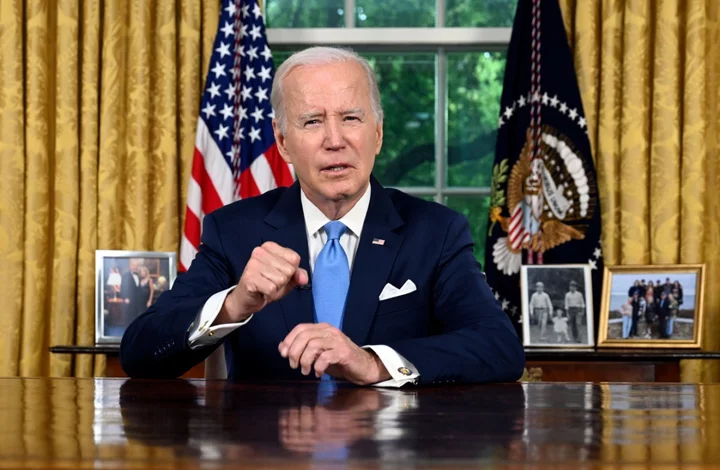
Biden expected to sign budget deal to raise debt ceiling
President Joe Biden is expected to sign legislation on Saturday to raise the debt ceiling, just two days before the U.S. Treasury warned that the country would struggle to pay its bills. The bipartisan measure, which was approved this week by the House and Senate, eliminates the potential for an unprecedented government default. “Passing this budget agreement was critical. The stakes could not have been higher," Biden said from the Oval Office on Friday evening. “Nothing would have been more catastrophic,” he said, than defaulting on the country's debt. The agreement was hashed out by Biden and House Speaker Kevin McCarthy, giving Republicans some of their demanded federal spending cuts but holding the line on major Democratic priorities. It raises the debt limit until 2025 — after the 2024 presidential election — and gives legislators budget targets for the next two years in hopes of assuring fiscal stability as the political season heats up. “No one got everything they wanted but the American people got what they needed,” Biden said, highlighting the “compromise and consensus” in the deal. “We averted an economic crisis and an economic collapse.” Biden used the opportunity to itemize the achievements of his first term as he runs for reelection, including support for high-tech manufacturing, infrastructure investments and financial incentives for fighting climate change. He also highlighted ways he blunted Republican efforts to roll back his agenda and achieve deeper cuts. “We’re cutting spending and bringing deficits down at the same time,” Biden said. “We're protecting important priorities from Social Security to Medicare to Medicaid to veterans to our transformational investments in infrastructure and clean energy.” Even as he pledged to continue working with Republicans, Biden also drew contrasts with the opposing party, particularly when it comes to raising taxes on the wealthy, something the Democratic president has sought. It’s something he suggested may need to wait until a second term. “I’m going to be coming back,” he said. “With your help, I’m going to win.” Biden's remarks were the most detailed comments from the Democratic president on the compromise he and his staff negotiated. He largely remained quiet publicly during the high-stakes talks, a decision that frustrated some members of his party but was intended to give space for both sides to reach a deal and for lawmakers to vote it to his desk. Biden praised McCarthy and his negotiators for operating in good faith, and all congressional leaders for ensuring swift passage of the legislation. “They acted responsibly, and put the good of the country ahead of politics,” he said. Overall, the 99-page bill restricts spending for the next two years and changes some policies, including imposing new work requirements for older Americans receiving food aid and greenlighting an Appalachian natural gas pipeline that many Democrats oppose. Some environmental rules were modified to help streamline approvals for infrastructure and energy projects — a move long sought by moderates in Congress. The Congressional Budget Office estimates it could actually expand total eligibility for federal food assistance, with the elimination of work requirements for veterans, homeless people and young people leaving foster care. The legislation also bolsters funds for defense and veterans, cuts back some new money for the Internal Revenue Service and rejects Biden’s call to roll back Trump-era tax breaks on corporations and the wealthy to help cover the nation’s deficits. But the White House said the IRS' plans to step up enforcement of tax laws for high-income earners and corporations would continue. The agreement imposes an automatic overall 1% cut to spending programs if Congress fails to approve its annual spending bills — a measure designed to pressure lawmakers of both parties to reach consensus before the end of the fiscal year in September. In both chambers, more Democrats backed the legislation than Republicans, but both parties were critical to its passage. In the Senate the tally was 63-36 including 46 Democrats and independents and 17 Republicans in favor, 31 Republicans along with four Democrats and one independent who caucuses with the Democrats opposed. The vote in the House was 314-117. ___ AP Congressional Correspondent Lisa Mascaro contributed to this report. Read More Ukraine war’s heaviest fight rages in east - follow live Charity boss speaks out over ‘traumatic’ encounter with royal aide FBI offers to show GOP chairman document that purports to relate to Biden, his family Republicans schedule 1st presidential debate for Aug. 23, but there's no guarantee Trump will attend DeSantis wraps up 1st early states tour as candidate with more personal touch in South Carolina
2023-06-03 12:19

Biden calls for national unity as he hails debt limit agreement in Oval Office address
President Joe Biden on Friday urged Americans not to give up on working across the political aisle to solve national problems as he hailed the bipartisan legislation passed by Congress to stave off a catastrophic default on the nation’s sovereign debt as a good compromise that will protect the economic progress of the past two years. Speaking from the Oval Office during the prime-time television viewing hours — the first time he has addressed the nation from behind the iconic desk hewed from timbers taken from HMS Resolute — Mr Biden said he’d chosen to speak to the American people that night to “report on a crisis averted” and explain what his administration and Congress “are doing to protect America’s future” by enacting the spending agreement negotiated between his aides and top House Republicans. The president said he would sign the legislation on Saturday. “Passing this budget agreement was critical. The stakes could not have been higher,” he said, just moments after he told Americans that the goals of the agreement — “keeping the full, faith, and credit of the United States” and enacting “a budget that continues to grow our economy and reflects our values as a nation” – are “essential” to continuing the progress made during the first two years of his presidency. The president said “nothing” would have been more irresponsible or catastrophic than a failure by the US to pay its bills and laid out the dire consequences that a default would’ve brought on Americans of all stripes. “Our economy would have been thrown in recession. Retirement accounts for millions of Americans would have been decimated, eight million Americans would have lost their jobs. Default would have destroyed our nation’s credit rating, which would have made everything from mortgages to car loans to funding for the government much more expensive and it would have taken years to climb out of that hole — and America standing as the most trusted, reliable financial partner in the world would have been shattered,” he said. While Mr Biden said it was “critical” to reach the agreement he will sign into law and called it “good news for the American people,” he also stressed the necessity of compromise given the realities of Republican control of the House of Representatives and the thin one-seat majority by which his own party controls the Senate, as well as the importance of provisions in the bill that will ensure key social programmes will receive full funding in the next two years. “No one got everything they wanted but the American people got what they needed. We averted an economic crisis and an economic collapse,” he said. “We’re cutting spending and bringing deficits down. And, we protected important priorities from Social Security to Medicare to Medicaid to veterans to our transformational investments in infrastructure and clean energy.” He also touted the fact that the agreement preserved legislation like the PACT Act– which extends veteran benefits to service members who suffered health complications from burn pits – and the Inflation Reduction Act, as well as the CHIPS and Science Act, which promotes manufacturing of semiconductors in the United States. “Remember at the beginning of this debate, some of my Republican colleagues are determined to get the clean energy investments,” he said. “I said no, we kept them all.” Mr Biden’s remarks came less than 24 hours after the Senate approved the compromise bill by a margin of 63-36, and just over two days after the House of Representatives voted to advance the legislation. They represent the most extensive public comments the president has made on the now-resolved crisis after weeks of silence from the White House. Many in the president’s own party had criticised his reluctance to inject himself into the public discourse surrounding the negotiations. But a source close to the White House end of the process told The Independent on Thursday that Mr Biden’s silence was a deliberate choice, made out of necessity to avoid inflaming Republicans who would need to vote for the legislation to avert what most experts say would have been a worldwide economic disaster brought on by a US debt default. In the end, Mr Biden’s strategy proved successful in preventing Republican opposition from sinking the 11th-hour deal to save the US and world economies, and the White House was able to cajole all but a limited number of Democrats to give their support as well. Of the 51 members of the Senate Democratic caucus, just five joined 31 Republicans in opposition to the measure, which will suspend the nation’s statutory debt limit through the entirety of the 2024 election cycle while implementing limited spending cuts sought by the GOP and enacting some work requirements for non-disabled adults without children between the ages of 50 and 54 to access the Supplemental Nutrition Assistance Program, otherwise known as SNAP and formerly known as food stamps. A number of arch-conservatives in the House of Representatives had criticised the bill as giving away far too much to the White House, and in the end 71 members of the GOP conference voted against it, necessitating Democrats to contribute enough support to pass the GOP-controlled chamber. The bipartisan legislation, which was unveiled earlier this week following marathon negotiations between the White House and the Republican-led House of Representatives, will be signed into law with just two days remaining before the 5 June “X Date,” the day on which Treasury Secretary Janet Yellen had projected that the government would exhaust its ability to pay its outstanding debt obligations absent intervention from Congress. The spending and debt ceiling deal is the first major bipartisan agreement between the White House and the House since Mr McCarthy was elected Speaker after a record 15 ballots in January. The president had for months pledged not to negotiate while the GOP held out the possibility of a default as leverage to force him to endorse rolling back much of the legislative accomplishments enacted during his first two years in office, while Mr McCarthy had committed not to allow any bill that would lift the debt limit to move through his chamber absent concessions from the White House. The impasse persisted for months until Mr Biden extended an invitation to Mr McCarthy after the House passed what the GOP dubbed the “Limit, Save, Grow Act” — a bill to lift the debt ceiling and enact massive cuts to government programmes. Negotiations kicked into high gear late last month after the president tapped Shalanda Young, the director of the Office of Management and Budget, and Counsellor to the President Steve Ricchetti — one of his longest-serving and most trusted aides — to engage with two GOP House members chosen by Mr McCarthy, House Financial Services Committee Chair Patrick McHenry and Louisiana Representative Garret Graves. The president praised House Speaker Kevin McCarthy, as well as Senate Majority Leader Chuck Schumer, Senate Minority Leader Mitch McConnell and House Minority Leader Hakeem Jeffries for undertaking good-faith efforts to move the bill through their respective chambers with deliberate speed. “They acted responsibly and put the good of the country ahead of politics,” he said. “A final vote in both chambers was overwhelming.” He closed his address by emphasizing unity and the importance of “see[ing] each other’s not as adversaries but as fellow Americans” and “treat[ing] each other with dignity and respect” as a way to “lower the temperature” so both parties can “work together ... to pursue progress, secure prosperity and keep the promise of America for everybody”. “I know bipartisanship is hard, and unity is hard, but we can never stop trying because in moments like this one, the ones we just faced, where the American economy in the world economy is at risk of collapsing,” he said. “There’s no other way. With reporting from Andrew Feinberg in New Hampshire and from Eric Garcia in Washington Read More Senate passes debt limit bill after marathon 11 amendment votes to avoid default Angry progressives and conservatives hit out as Democrats push through Biden-McCarthy debt ceiling deal FBI offers to show GOP chairman document that purports to relate to Biden, his family Republicans schedule 1st presidential debate for Aug. 23, but there's no guarantee Trump will attend DeSantis wraps up 1st early states tour as candidate with more personal touch in South Carolina
2023-06-03 07:58
